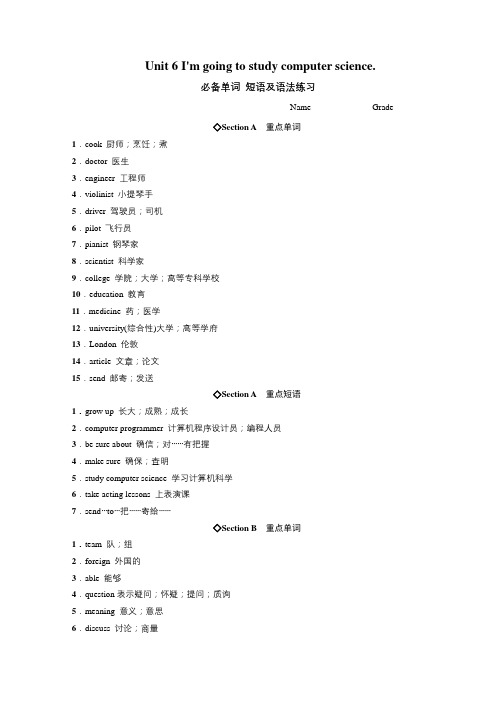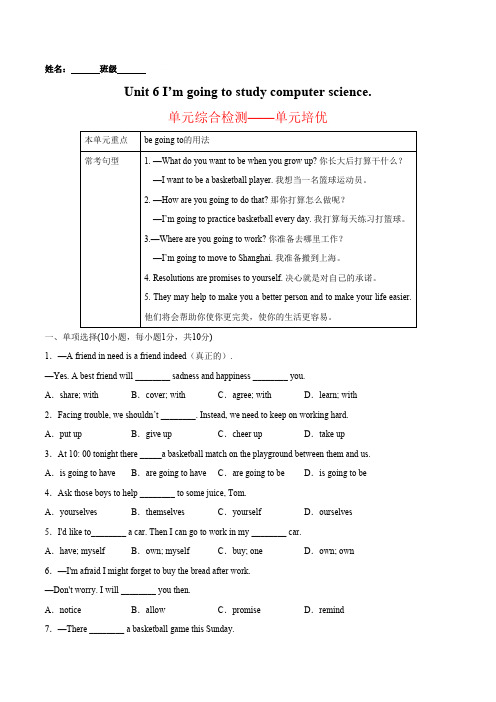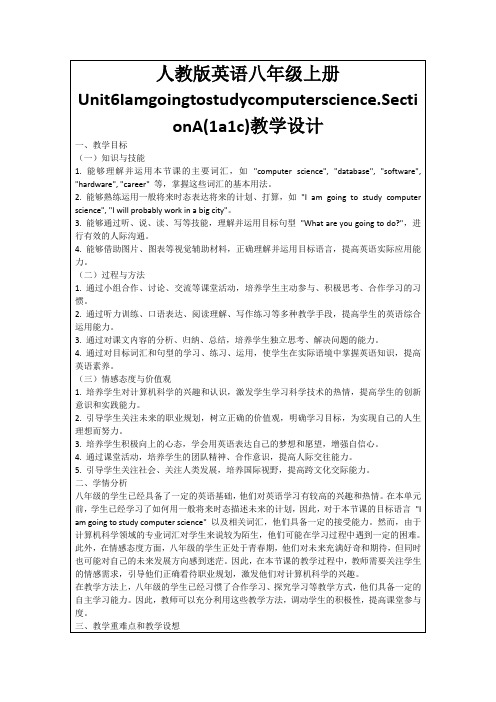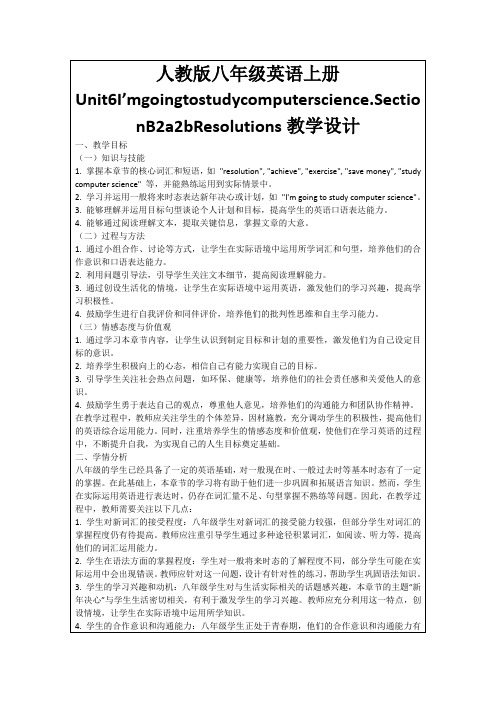八年级英语上册Unit6Iamgoingtostudycomputerscience(第4课时)SectionB习题课件(新版)人教新目标版
人教版八年级英语上册Unit6I’mgoingtostudycomputerscience

难点:如何让学生在实际语境中灵活运用一般将来时态,以及如何引导学生正确表达自己的未来职业规划。
2.重点:提高学生的听说能力和口语表达能力,使其能够就未来职业规划进行流畅的交流。
难点:如何在有限的课堂时间内,充分调动学生的积极性,使他们在听说练习中取得实质性进步。
2.学会使用一般将来时态表达未来的计划、打算,如"I'm going to study computer science.",并能运用一般将来时态进行句子构建。
3.能够理解并运用目标语言描述不同职业的特点、工作内容以及所需技能。
4.提高听力技能,能够从听力材料中获取关键信息,了解他人的职业规划。
5.提高口语表达能力,能够就自己的未来职业规划与他人进行简单交流。
a.设计一个职业体验活动,邀请同学参与,共同体验不同职业的工作,提高对职业规划的认识。
b.组织一次英语职业规划演讲比赛,邀请同学担任评委,锻炼口语表达能力,增进相互了解。
作业要求:
1.作业完成后,认真检查,确保无误。
2.按时提交作业,养成良好的学习习惯。
3.积极参与课堂讨论和分享,提高英语综合运用能力。
2.过程说明:学生通过小组讨论,相互交流职业规划,提高口语表达能力,同时加深对他人职业选择的理解。
(四)课堂练习
1.教学活动设计:教师设计一些与职业规划相关的练习题,如填空、选择、匹配等,让学生在课堂上完成。
2.练习内容:练习题涵盖一般将来时态的用法和职业规划相关词汇,帮助学生巩固所学知识。
3.过程说明:通过课堂练习,让学生在实际操作中掌握一般将来时态,提高运用能力。
4.引导学生进行课堂展示,提高学生的口语表达能力,增强自信心。
人教版八年级英语上Unit6I’mgoingtostudycomputerscience

(一)导入新课,500字
在导入环节,我将采用图片预测和讨论的方法激发学生对未来职业的兴趣。首先,在大屏幕上展示一系列与职业相关的图片,如科学家在实验室工作、飞行员驾驶飞机、医生为患者检查等。同时,提问学生:“What do you think these people do?”让学生观察图片并预测这些人的职业。
三、教学重难点和教学设想
(一)教学重难点
1.重点:学生能够熟练运用与未来职业规划相关的词汇和句型,如“I’m going to ቤተ መጻሕፍቲ ባይዱe a...”和“I’m going to study...”,自信地表达自己的职业理想。
难点:学生能够在实际语境中,灵活运用所学知识进行职业规划的讨论和表达,提高语言综合运用能力。
5.阅读与写作:指导学生阅读相关文章,提取关键信息,并运用所学知识进行写作练习,提高阅读理解能力和写作技巧。
6.课堂小结:通过师生互动,总结本节课的学习内容,巩固所学知识。
7.课后作业:布置适量的课后作业,包括词汇练习、句型练习、阅读理解等,巩固课堂所学。
8.拓展活动:鼓励学生参加课后拓展活动,如职业体验、社会调查等,将所学知识与社会实践相结合,提高综合素质。
人教版八年级英语上Unit6I’mgoingtostudycomputerscience.(SectionA1a2c)教学设计
一、教学目标
(一)知识与技能
1.学生能够掌握并运用与未来职业规划相关的词汇,如scientist, engineer, pilot, doctor, teacher, lawyer, programmer等,以及表达对未来职业意向的句型“I’m going to be a...”和“I’m going to study...”。
人教八年级上册Unit 6 I’m going to study computer science

Unit 6 I'm going to study computer science.必备单词短语及语法练习Name___________ Grade___________◇Section A重点单词1.cook 厨师;烹饪;煮2.doctor 医生3.engineer 工程师4.violinist 小提琴手5.driver 驾驶员;司机6.pilot 飞行员7.pianist 钢琴家8.scientist 科学家9.college 学院;大学;高等专科学校10.education 教育11.medicine 药;医学12.university(综合性)大学;高等学府13.London 伦敦14.article 文章;论文15.send 邮寄;发送◇Section A重点短语1.grow up 长大;成熟;成长2.computer programmer 计算机程序设计员;编程人员3.be sure about 确信;对……有把握4.make sure 确保;查明5.study computer science 学习计算机科学6.take acting lessons 上表演课7.send…to…把……寄给……◇Section B重点单词1.team 队;组2.foreign 外国的3.able 能够4.question表示疑问;怀疑;提问;质询5.meaning 意义;意思6.discuss 讨论;商量7.promise 承诺;诺言;许诺8.beginning 开头;开端9.improve 改进;改善10.physical 身体的11.themselves 他(她、它)们自己12.hobby 业余爱好13.weekly 每周的(地)14.schoolwork 学校作业;功课15.own 自己的;本人的16.personal 个人的;私人的17.relationship 关系;联系◇Section B重点短语1.be able to 能够做某事2.at the beginning of 在……开始3.write down 写下;记录下4.have to do with 关于;与……有关系5.take up (尤指为消遣)学着做;开始做6.make resolutions 下决心;制定计划7.the meaning of………的意思/意义8.make promises to sb.向某人保证/承诺◇词形变换1.violinist→(小提琴)violin2.driver→(动词)drive3.pianist→(钢琴)piano4.scientist→(科学)science→(科学上的;科学的)scientific 5.medicine→(形容词)medical6.foreign→(名词)foreigner7.begin→(名词)beginning8.themselves→(人称代词主格)they→(人称代词宾格)them 9.weekly→(名词)week10.own→(名词)owner11.personal→(名词)person◇重点句型1.—What do you want to be when you grow up?你长大后想做什么?—I want to be a basketball player.我想当一名篮球运动员。
人教版英语八年级上册Unit6I’mgoingtostudycomputersci单元综合检测含答案

姓名:班级Unit 6 I’m going to study computer science.单元综合检测——单元培优本单元重点be going to的用法常考句型 1. —What do you want to be when you grow up? 你长大后打算干什么?—I want to be a basketball player. 我想当一名篮球运动员。
2. —How are you going to do that? 那你打算怎么做呢?—I’m going to practice basketball every day. 我打算每天练习打篮球。
3.—Where are you going to work? 你准备去哪里工作?—I’m going to move to Shanghai. 我准备搬到上海。
4. Resolutions are promises to yourself. 决心就是对自己的承诺。
5. They may help to make you a better person and to make your life easier.他们将会帮助你使你更完美,使你的生活更容易。
一、单项选择(10小题,每小题1分,共10分)1.—A friend in need is a friend indeed(真正的).—Yes. A best friend will ________ sadness and happiness ________ you.A.share; with B.cover; with C.agree; with D.learn; with2.Facing trouble, we shouldn’t ________. Instead, we need to keep on working hard.A.put up B.give up C.cheer up D.take up3.At 10: 00 tonight there _____a basketball match on the playground between them and us.A.is going to have B.are going to have C.are going to be D.is going to be4.Ask those boys to help ________ to some juice, Tom.A.yourselves B.themselves C.yourself D.ourselves5.I'd like to________ a car. Then I can go to work in my ________ car.A.have; myself B.own; myself C.buy; one D.own; own6.—I'm afraid I might forget to buy the bread after work.—Don't worry. I will ________ you then.A.notice B.allow C.promise D.remind7.—There ________ a basketball game this Sunday.—Wonderful!A.is going to be B.are going to be C.is going to have D.will have8.There ________ a football match on TV this afternoon and I am going to ________ it.A.is going to have; watch B.is going to have; look at C.is going to be; watchD.is going to be; look at9.—Where are you going to work after you finish university?—________. Maybe in Shanghai.A.I want to be a doctor B.I’m not sureC.Me too D.Sounds like a good plan10.Please check your paper to ___________ there are no mistakes.A.think of B.try out C.find out D.make sure二、完型填空(1小题,每小题1分,共15分)Collecting coins in my hobby, and it has brought me a lot of fun. Now I share the hobby 11 my children. Getting children interested in coin collecting 12 easy. Here are four ways I have used to get my kids 13 . Start smallMany coin collectors buy coins of great value(价值). But children needn’t consider the value. Let your children start with a set 14 Jefferson Nikcels(5分镍币). This set is the 15 to collect and almost all of them can be 16 in coin shops.Bring home surpriseOK, you know the coin they are looking at is 17 and common. But you should be excited at 18 they are looking at.Buy them a nice boxGo shopping and choose 19 nice box for your children 20 their coins in. 21 will help them to keep their collection organized. 22 , having a nice box will keep their excitement high. Every time they show their collection to their friends, they will feel good.Give them one of 23Find a great coin in your collection and hand it down to your children. This coin needs to be a bit common, so 24 something happens to it, the world doesn’t end. But it also 25 to be special, or your children may have no interest in it.11.A.by B.in C.on D.with12.A.is B.isn’t C.are D.aren’t 13.A.started B.start C.starts D.starting 14.A.so that B.so far C.such as D.such that 15.A.easy B.easier C.easyer D.easiest 16.A.find B.found C.finding D.finds 17.A.use B.useful C.useless D.uselessly 18.A.what B.when C.who D.where 19.A.a B.an C.the D./ 20.A.keeping B.kept C.to keep D.keeps 21.A.It B.What C.These D.Those 22.A.Also B.Too C.Although D.Because 23.A.you B.your C.yours D.themselves 24.A.if B.that C.what D.which 25.A.needed B.needs C.is needing D.need三、阅读单选(20小题,每小题2分,共40分)ATrain No.From To Departure(离开)Time Arrival Time11Beijing Shenyang6:3515:50 185Taiyuan Chengdu13:0919:30 186Chengdu Taiyuan22:505:05 271Tianjin Beijing8:3510:21 26.The train from Beijing to Shenyang leaves at________A.5:05B.6:35C.8:35D.17:50 27.We have to spend ________on the train if we go to Shenyang from Beijing. A.17 hours and 50 minutes B.24 hours and 25 minutesC.6 hours and 35minutes D.9 hours and 15minutes28.If you want to go to Chengdu from Taiyuan, you can take the________ train.A.No.11B.No.185C.No.186D.No.27129.The No. 186 train gets to Taiyuan at________.A.10:50 am B.10:50 pm C.5:05 am D.5:05 pm30.It takes ________ from Tianjin to Beijing by train.A.about two hours B.half an hourC.about an hour D.more than two hoursBTable manners are about how to behave when you eat a meal. Different countries have different table manners. Now let’s see some table manners in the following countries.JapanIt is OK to make some noises when you eat noodles in Japan. Making some noises is not rude but is praise to the cook. The Japanese also say it tastes better if you make some noises while eating.What else to watch: it’s important to say “Thanks” before and after a meal.FranceIn France, a meal is like a ceremony. People enjoy it and make it a special event. You should never discuss money over dinner. And going Dutch (各自付费) is not polite.What else to watch: you need to finish everything on your plate.MexicoIn Mexico, whenever you catch the eye of someone who’s eating, even a stranger, it’s good manners to say “provecho”, which means “enjoy”.What else to watch: where you sit is important in this country. Before you get seated, look for place cards, or wait until the host seats you. And you must say “Enjoy your meal” before you leave the table.31.What’s the polite way to eat noodles in Japan?A.Eating quietly.B.Eating quickly.C.Leaving some.D.Making some noises.32.What don’t people like to talk about over dinner in France?A.Money.B.Weather.C.Sports.D.News.33.What should you say before you leave the table in Mexico?A.Goodbye.B.Enjoy your meal.C.Thank you.D.The food is delicious. 34.Which of the following is TRUE?A.The Japanese always eat quietly.B.People in France like going Dutch when eating out.C.Where you sit is important in Mexico.D.Strangers never talk to the people who are eating in Mexico.35.This passage is mainly about _________.A.sports stars B.dinner parties C.eating habits D.table mannersC“Tell me what you are going to do next Sunday morning , Jim ?”Mr .Wang asks , “I’m going to see a new film . It’s an English film about the life of the students in America. Bill tells me it’s very interesting .”“After seeing the film , what are you going to do ?” Mr. Zhang wants to know. “I’m going to read Chinese ,” Jim says . “Do you like it ?” asks Mr.Wang . “Chinese is not easy for me , but I like it very much . I am going to work hard at it . After lunch I’m going to have English and other subjects . I think I can do better than before .“Then , what about Sunday evening ?” Mr. Wang asks . “ After supper I’m going to help Han Mei with her English . She wants my help ,” Jim says .“You are going to have a busy day , aren’t you ?says Mr.Wang.36.What is Jim going to do next Sunday morning ?A.See a film.B.Visit his grandma.C.Go fishing.D.Take guitar lessons.37.What is the film about ?A.The life of the students in China.B.The life of the students in America.C.Foreign life.D.School and college.38.What is Jim going to do after seeing the film?A.Play soccer.B.Study English .C.Read Chinese.D.Write a story.39.How does Jim think of Chinese ?A.He like it .B.He dislike it .C.It’s easy for him .D.He doesn’t know.40.What is Jim going to help Han Mei with ?A.Chinese.B.Math.C.Science.D.English .DLike many other young boys, I didn't know what I wanted to be when I was a middle school student. My mother wanted me to be a teacher like her, but it seemed that I was not interested in it. My father wanted me to be a pianist. However, I couldn't stand spending all of my time in front of a piano.I got my goal(目标) after I went to high school. I got a parttime job at the school radio station and I found it was interesting. I loved to discuss school life and my favorite music with my schoolmates on the radio. I kept doing this job during the next six years. When I left the university, I got a fulltime job at a radio station. My career(事业) began. Now my program is successful and I have a lot of fans. I enjoy my job and my life.41.What did the writer's mother do?A.A teacher.B.A pianist.C.A doctor.D.A scientist.42.When did the writer start working at a radio station?A.When he was ten years old.B.When he was a high school student.C.When he studied at the university.D.After he left the university.43.What did the writer talk about on the radio?A.Sports.B.Famous films.C.School life and his favorite music.D.Famous people.44.Which of the following is TRUE?A.The writer was interested in teaching.B.The writer couldn't play the piano.C.The writer often interviewed(采访) stars.D.The writer's program is very popular now.45.Which is the best title of the passage?A.Never listen to your parentsB.Study hard to make your dream come trueC.No job is easy to getD.The parttime job helped me find my career四、短文汉语提示填空(10小题,每小题1分,共10分)In the Name of the People, it is a great successful drama 46. is popular withChinese people at present. It is the newest TV series which has just been put on 47.last month. It is quite 48.from other popular TV shows.The series, about China’s anti-corruption campaign(反腐运动), has attracted 49.of viewers across the country. Some have compared it to the American political drama House of Cards, which also have been a great 50. .“This TV show feels so real. It really 51.people up,” one viewer wrote on so-cial media networkWeibo.” “I am so excited to watch it that my eyes are 52.withtears.” said another 53. .Zhou Meisen, the writer of this play, said that he spent several years 54.thisfantastic story. He aimed to show that the good people always 55.the bad guys atthe end of the day.五、阅读回答问题(5小题,每小题2分,共10分)Jack is going to be a pilot. He wants to fly an airplane. But Jack is not a rich man. He doesn’t have an airplane. He has only a chair. Jack ties(系)45 big balloons(气球)to his chair and then sits in the chair. His chair goes up.For a few minutes, everything is fine. The view from the chair is beautiful. Jack can see houses and trees below him. He is happy. He is flying.The chair goes up very high. Jack is afraid. “I don’t want to go very high,” Jack thinks.“I want to go down a little.” With a small gun(枪),Jack shoots l0 balloons. Then something terrible happens. Jack drops the gun, and it falls to the ground. Jack can’t shoot more balloons. The chair goes up and up.Jack is three miles above the ground. Airplanes are flying over him and under him Jack has a small radio. “ Help! Help!” he says into the radio. “ I’m flying in a chair, and I want to come down!” People hear Jack, but they can’t help him.Jack flies in the chair for 45 minutes. Then the balloons begin to lose air. Slowly the chair comes down, and Jack is back on the ground. He is not hurt.根据短文内容,回答下列问题。
人教版英语八年级上册Unit6Iamgoingtostudycomputerscience

四、教学内容与过程
(一)导入新课
1.教学活动:教师展示一张包含各种职业的图片,引导学生观察并说出自己认识的职业,为新课的学习做好铺垫。
2.教学内容:通过询问学生“Do you know any of these jobs?”,让学生运用已学过的词汇描述图片中的职业,为新课的词汇学习打下基础。
4.能够借助图片、图表等视觉辅助材料,正确理解并运用目标语言,提高英语实际应用能力。
(二)过程与方法
1.通过小组合作、讨论、交流等课堂活动,培养学生主动参与、积极思考、合作学习的习惯。
2.通过听力训练、口语表达、阅读理解、写作练习等多种教学手段,提高学生的英语综合运用能力。
3.通过对课文内容的分析、归纳、总结,培养学生独立思考、解决问题的能力。
(二)教学设想
1.创设情境:通过展示计算机科学领域的图片、视频等材料,激发学生对计算机科学的兴趣,为新课的学习营造良好的氛围。
2.任务型教学:设计各种任务,如小组讨论、角色扮演、听力练习等,让学生在实际语境中运用目标语言,提高英语实际应用能力。
3.分层次教学:针对不同学生的学习需求,设计不同难度的教学活动,使每个学生都能在活动中得到锻炼和提升。
2.重点:提高学生的听力理解能力,使他们能够从听力材料中获取关键信息,并运用到实际对话中。
难点:引导学生从听力材料中捕捉细节信息,提高信息处理和运用能力。
3.重点:培养学生积极参与课堂活动,发展合作学习、探究学习的能力。
难点:如何在课堂活动中兼顾不同学生的学习需求,确保每个学生都能在活动中得到锻炼和提升。
三、教学重难点和教学设想
(一)教学重难点
人教版八年级英语上册Unit6I’mgoingtostudycomputerscience

3.学生的学习兴趣和动机:八年级学生对与生活实际相关的话题感兴趣,本章节的主题“新年决心”与学生生活密切相关,有利于激发学生的学习兴趣。教师应充分利用这一特点,创设情境,让学生在实际语境中运用所学知识。
5.词汇积累:要求学生在本节课学到的词汇基础上,再自主查找三个与新年决心相关的英语词汇,并学会运用。这有助于学生扩大词汇量,提高英语表达能力。
示例:Find three additional English words related to New Year's resolutions and learn to use them.
人教版八年级英语上册Unit6I’mgoingtostudycomputerscience.SectionB2a2bResolutions教学设计
一、教学目标
(一)知识与技能
1.掌握本章节的核心词汇和短语,如"resolution", "achieve", "exercise", "save money", "study computer science"等,并能熟练运用到实际情景中。
2.学习并运用一般将来时态表达新年决心或划,如"I'm going to study computer science"。
3.能够理解并运用目标句型谈论个人计划和目标,提高学生的英语口语表达能力。
4.能够通过阅读理解文本,提取关键信息,掌握文章的大意。
(二)过程与方法
1.通过小组合作、讨论等方式,让学生在实际语境中运用所学词汇和句型,培养他们的合作意识和口语表达能力。
人教版八年级上册英语 Unit 6 I'm going to study computer s导学案
|人物|What|How|When|Where|
|---|---|---|---|---|
|Chenghan| | | | |
2.再次播放录音,核对答案。
3.引导学生分析听力文本中的重点句型和短语。
(3)2c口语练习(8分钟)
1.学生两人一组,根据2b中的表格信息进行问答练习。
2.强调在实际情境中运用英语交流未来计划的重要性。
(四)课堂检测(2分钟)
1.用“be going to”结构造句,描述自己未来的计划。
2.根据所给情境,进行简短的英语对话,谈论未来的职业打算。
五、课后拓展
1.用英语写一篇短文,描述自己未来的职业规划,包括想从事的职业、原因、准备如何实现等。
2.与同学或家人用英语交流关于未来的想法和计划。
2.邀请几组学生上台展示他们的对话。
(4)2d角色扮演(9分钟)
1.学生自主阅读2d的对话,理解其含义。
2.教师讲解对话中的重点语言点和句型。
3.学生分组进行角色扮演,模仿Andy和Ken的对话。
4.请几组学生上台表演,其他学生进行评价。
(三)课堂小结(3分钟)
1.回顾本节课所学的重点内容,包括“be going to”结构的用法、关于未来计划的表达方式以及听力和口语练习中的关键句型。
课题
人教版八年级上册英语Unit 6 I'm going
to study computer science Section A2a -2d导学案
班级
备课教师
课型
第2课时
课时
1
一、学习目标
1.能够听懂并理解关于未来计划的听力内容,获取关键信息。
人教版英语八年级上册Unit6I'mgoingtostudycomputerscience
(五)总结归纳
1.教师引导学生回顾本节课所学内容,总结一般将来时态的用法和计算机科学相关词汇。
2.学生分享自己在课堂上的收获和感悟,教师给予肯定和鼓励。
3.教师强调本节课的情感态度与价值观,鼓励学生树立正确的职业观念,为实现自己的梦想而努力奋斗。
4.引导学生关注社会发展,了解不同职业的特点和要求,为自己未来的发展做好规划。
二、学情分析
八年级的学生已经具备了一定的英语基础,他们对英语学习有一定的兴趣和热情。在本章节的学习中,学生已经掌握了基本的语法知识,如一般现在时、一般过去时等,为本节课学习一般将来时态打下了基础。此外,学生对未来职业规划已有初步的认识,但可能对某些职业的了解还不够深入。
5.结合所学知识,与家长进行一次关于未来职业规划的英文对话,将对话过程录音或视频记录,并在课堂上与其他同学分享。
6.学生自主设计一份关于计算机科学相关职业的调查问卷,向身边的朋友或家人进行调查,了解他们对这些职业的看法和认识。
作业布置注意事项:
1.作业难度要适中,既要保证学生对所学知识的巩固,又要激发学生的兴趣和思考。
2.完成课后练习册中与本节课相关的练习,巩固对一般将来时态和词汇的掌握。
3.学生以小组为单位,选择一个计算机科学相关职业,进行资料搜集和整理,制作一份PPT,向同学们介绍这个职业的发展前景、工作内容和所需技能。
4.观看一部与职业规划相关的英文影片,并记录下影片中出现的与未来职业规划相关的表达,与同学们分享观影心得。
4.引导学生通过自主学习、探究学习等方式,培养良好的学习习惯和自主学习能力。
(三)情感态度与价值观
1.培养学生对未来职业的兴趣和热情,鼓励他们为自己的梦想努力奋斗。
人教版英语八上Unit6I’mgoingtostudycomputerscience
作业布置要求:
1.学生按时完成作业,保持书写规范,提高作业质量。
2.家长协助监督,确保学生认真完成作业,培养良好的学习习惯。
3.教师在批改作业时,关注学生的进步和问题,给予及时反馈和指导。
2.听力训练:引导学生通过听力练习,获取关键信息,培养其听力技巧。
3.小组合作:组织学生进行小组讨论,鼓励他们运用所学知识,进行口语交流,提高口语表达能力。
4.问答练习:通过2a-2e部分的问答练习,巩固所学词汇和语法,提高学生的语言运用能力。
5.写作实践:引导学生仿照2a-2e部分的问答模式,编写一段关于未来职业规划的对话,锻炼其写作技巧。
-听力难点:学生在听力过程中对关键信息的抓取和处理。
-口语难点:学生在口语交流中词汇的准确性和语句的流畅性。
-写作难点:学生如何将所学的词汇和语法知识应用到写作中,编写出结构教学设想:
1.词汇教学:
-利用实物、图片、例句等多种方式呈现词汇,帮助学生形象记忆。
- What kind of job do you want to do in the future?
- Why do you want to choose this job?
- What will you do to achieve your goal?
2.每个小组派代表分享讨论成果,其他小组进行评价和提问。
3.听力教学:
-提供多种听力材料,如录音、视频等,提高学生的听力兴趣和适应能力。
-设计不同难度的听力任务,逐步提升学生的听力技巧。
-听力训练后,进行信息反馈和讨论,帮助学生总结听力策略。
4.口语教学:
人教新目标八年级英语上册Unit6I’mgoingtostudycomputerscience
教学策略:结合课堂所学,设计形式多样的作业,如写作、调查报告等,提高学生的综合语言运用能力。
四、教学内容与过程
(一)导入新课(500字)
1.教师以提问方式引导学生回顾上一课的内容,为新课的学习做好铺垫。
提问示例:“What did you learn about your friends’ hobbies in the last lesson? Can you share some with us?”
人教新目标八年级英语上册Unit6I’mgoingtostudycomputerscience.SectionA(1a2c)教学设计
一、教学目标பைடு நூலகம்
(一)知识与技能
本节课是人教新目标八年级英语上册Unit 6 “I’m going to study computer science”的Section A部分,旨在让学生掌握与未来职业规划相关的词汇和表达方式。通过本节课的学习,学生应达到以下知识与技能目标:
3.教师巡回指导,关注学生的语言运用情况,并及时给予反馈和鼓励。
(四)课堂练习(500字)
1.教师设计课堂练习,让学生运用所学词汇和句型进行实践。
示例:“Now, let’s do some exercises. Complete the sentences with the correct form of the simple future tense and the new words we learned.”
2.教师组织学生进行角色扮演活动,模拟真实场景下的职业规划讨论。
示例:“Imagine you are at a career fair. You can talk with your classmates about their future job plans. Use the target language to ask and answer questions.”
